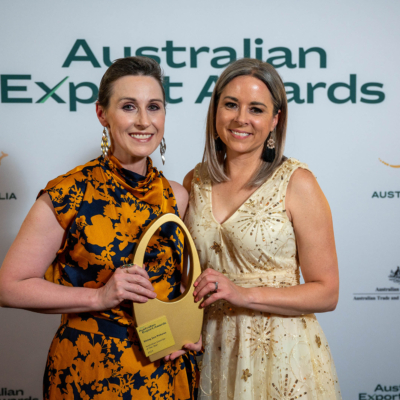RSP and UniSA Acknowledged in AFR's Higher Education Employability Awards

Rising Sun Pictures and the University of South Australia acknowledged in Australian Financial Review Higher Education Employability Awards!
Rising Sun Pictures (RSP) and the University of South Australia (UniSA) were finalists in the Australian Financial Review Higher Education Employability Award for their distinctive visual effects training programs, which have achieved outstanding employment outcomes.

RSP Teaching Assistant Dakshdeep Singh, UniSA Creative Lecturer Danny Ward, RSP Teaching Assistant Michael Kranitis, UniSA Program Director in Visual EFfects Josh McCarthy, RSP Manager, Training and Education Anna Hodge, UniSA Creative General Manager Sam Goodred, RSP Chief Financial Officer Gareth Eriksson.
“We’ve proven that our visual effects (VFX) training is exceptional,” said Ms Hodge. “Visual effects studios and recruiters are constantly contacting us, eager to interview our graduates. We’ve developed a winning formula, which we continually refine in response to industry, staff, and student feedback. UniSA has been a wonderful partner, and together, we are continuing to produce amazing results for the global industry.”
The collaboration between UniSA and RSP, has created a range of industry-focused learning programs that equip students with the necessary skills to thrive in the competitive global VFX industry. “Our students are joining a rapidly growing VFX industry that’s worth more than $550 million in Australia alone. They are experiencing an unparalleled industry-based learning opportunity onsite at RSP’s Adelaide studio, and have the opportunity to work on industry-standard projects in a simulated production studio,” said UniSA Creative Executive Dean, Professor Craig Batty. “Throughout the program, students gain an understanding of all stages of the professional production cycle, from conceptualisation right through to post-production. They also develop knowledge and practice of core VFX areas including compositing and tracking, dynamic effects and lighting, creature effects, 3D animation and 3D modelling.”
Since its inception, the program has launched well over 200 careers in VFX, with 76 UniSA graduates currently employed at RSP. These graduates have contributed to 32 of the past 40 films shortlisted for the VFX Academy Award and have been hired by VFX companies around the world.
The program has been so successful that in 2024 UniSA and RSP launched a standalone Bachelor of Visual Effects degree, and two new graduate certificate programs in 3D Animation and Creature Effects.
The curriculum of the UniSA-RSP education partnership is designed to ensure that graduate outcomes remain strong and relevant to industry needs. UniSA is recognised as one of Australia’s leading universities for graduate employability and is ranked by Times Higher Education among the world’s top 100 young universities for industry collaborations. Partnered learning is a core part of UniSA’s teaching philosophy.
RSP President Jennie Zeiher remarked, “This is the only university-accredited program where students train onsite at a world-class studio and are taught by industry working artists. They not only gain practical skills but also receive the mentoring and career advice needed to begin and sustain rewarding, lifelong careers.”
The expansion of the UniSA-RSP offerings was prompted by strong interest from prospective students and unprecedented industry demand. According to RSP President Jennie Zeiher, post-COVID, “the worldwide visual effects industry experienced unprecedented growth, driving a record demand for talent.”
UniSA’s Dr Josh McCarthy noted that the UniSA teaching team collaborated with industry to identify growth areas and skill shortages,
“We worked with local and national industry to identify growth areas and skill shortages,” he said. “3D animation and creature effects were two disciplines of particular need. The new standalone degree in visual effects is similarly designed to accommodate student demands and industry requirements. We want to produce graduates with multidisciplinary skills and the flexibility to move between specialisations. It’s a comprehensive approach toward training.”


